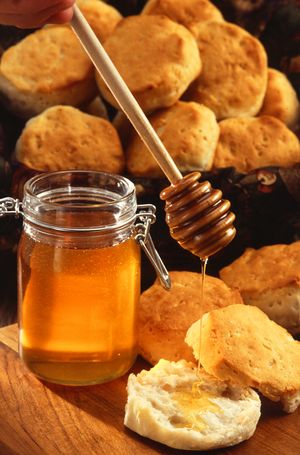Note: This is a project under development. The articles on this wiki are just being initiated and broadly incomplete. You can Help creating new pages.
Difference between revisions of "Madhu - Honey"
Chaithrika (talk | contribs) |
Chaithrika (talk | contribs) |
||
| Line 1: | Line 1: | ||
| − | [[File:Runny hunny.jpg|thumb|right|'' | + | [[File:Runny hunny.jpg|thumb|right|''A jar of honey with a honey dipper and an American biscuit'']] |
'''Honey''' is a sweet food made by bees foraging nectar from flowers. The variety produced by honey bees (the genus Apis) is the one most commonly referred to, as it is the type of honey collected by most beekeepers and consumed by people. Honey is also produced by bumblebees, stingless bees, and other hymenopteran insects such as honey wasps, though the quantity is generally lower and they have slightly different properties compared with honey from the genus Apis. Honey bees convert nectar into honey by a process of regurgitation and evaporation: they store it as a primary food source in wax honeycombs inside the beehive. | '''Honey''' is a sweet food made by bees foraging nectar from flowers. The variety produced by honey bees (the genus Apis) is the one most commonly referred to, as it is the type of honey collected by most beekeepers and consumed by people. Honey is also produced by bumblebees, stingless bees, and other hymenopteran insects such as honey wasps, though the quantity is generally lower and they have slightly different properties compared with honey from the genus Apis. Honey bees convert nectar into honey by a process of regurgitation and evaporation: they store it as a primary food source in wax honeycombs inside the beehive. | ||
Revision as of 12:55, 19 October 2016
Honey is a sweet food made by bees foraging nectar from flowers. The variety produced by honey bees (the genus Apis) is the one most commonly referred to, as it is the type of honey collected by most beekeepers and consumed by people. Honey is also produced by bumblebees, stingless bees, and other hymenopteran insects such as honey wasps, though the quantity is generally lower and they have slightly different properties compared with honey from the genus Apis. Honey bees convert nectar into honey by a process of regurgitation and evaporation: they store it as a primary food source in wax honeycombs inside the beehive.
Medical uses
- Wounds and burns
Honey contains trace amount of compounds implicated in preliminary studies to have wound healing properties, such as hydrogen peroxide and methylglyoxal.
There is some evidence that honey may help healing in skin wounds after surgery and mild (partial thickness) burns when used in a dressing, but in general the evidence for the use of honey in wound treatment is of such low quality that firm conclusions cannot be drawn.
Evidence does not support the use of honey-based products in the treatment of venous stasis ulcers or ingrowing toenail.
There is ongoing research into medical uses for honey, particularly in the face of antimicrobial resistance to modern antibiotics.
- Cough
For chronic cough and acute cough, a Cochrane review found no strong evidence for or against the use of honey. For treating children, the study concluded that honey possibly helps more than no treatment.
The UK Medicines and Healthcare Products Regulatory Agency recommends avoiding giving over the counter cough and common cold medication to children under 6, and suggests "a homemade remedy containing honey and lemon is likely to be just as useful and safer to take", but warns that honey should not be given to babies because of the risk of infant botulism. The World Health Organization recommends honey as a treatment for coughs and sore throats, including for children, stating that there is no reason to believe it is less effective than a commercial remedy. Honey is recommended by one Canadian physician for children over the age of 1 for the treatment of coughs as it is deemed as effective as dextromethorphan and more effective than diphenhydramine.
- Other
People who have a weakened immune system should not eat honey because of the risk of bacterial or fungal infection.
No evidence shows the benefit of using honey to treat cancer,although honey may be useful for controlling side effects of radiation therapy or chemotherapy applied in cancer treatment.
Consumption is sometimes advocated as a treatment for seasonal allergies due to pollen, but there is inconclusive scientific evidence to support the claim. Honey is generally considered ineffective for the treatment of allergic conjunctivitis.
Preliminary studies found honey to contain an antimicrobial peptide called bee defensin-1.Some in vitro studies show that honey can kill Methicillin-resistant Staphylococcus aureus (MRSA), β-haemolytic streptococci and vancomycin-resistant Enterococc
